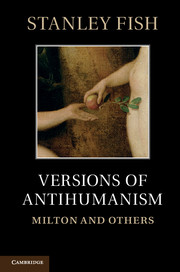Book contents
- Frontmatter
- Contents
- Acknowledgments
- Introduction: intention, historicism and interpretation
- Part I Milton
- Part II Early modern literature
- Chapter 8 “Void of storie”
- Chapter 9 Authors–readers
- Chapter 10 Marvell and the art of disappearance
- Chapter 11 Masculine persuasive force: Donne and verbal power
- Chapter 12 How Hobbes works
- Index
- References
Chapter 11 - Masculine persuasive force: Donne and verbal power
Published online by Cambridge University Press: 05 May 2012
- Frontmatter
- Contents
- Acknowledgments
- Introduction: intention, historicism and interpretation
- Part I Milton
- Part II Early modern literature
- Chapter 8 “Void of storie”
- Chapter 9 Authors–readers
- Chapter 10 Marvell and the art of disappearance
- Chapter 11 Masculine persuasive force: Donne and verbal power
- Chapter 12 How Hobbes works
- Index
- References
Summary
“MY FEIGNED PAGE”
For a very long time I was unable to teach Donne's poetry. I never had anything good to say about the poems, and would always find myself rereading with approval C.S. Lewis's now fifty-year-old judgment on Donne as the “saddest” and “most uncomfortable of our poets,” whose verse “exercises the same dreadful fascination that we feel in the grip of the worst kind of bore – the hot eyed, unescapable kind.” Indeed my own response to the poetry was even more negative than Lewis's: I found it sick, and thought that I must be missing the point so readily seen by others. I now believe that to be the point: Donne is sick and his poetry is sick; but he and it are sick in ways that are interestingly related to the contemporary critical scene. In short, the pleasures of diagnosis have replaced the pleasure I was unable to derive from the verse.
Let's get the diagnosis out of the way immediately: Donne is bulimic, someone who gorges himself to a point beyond satiety, and then sticks his finger down his throat and throws up. The object of his desire and of his abhorrence is not food, but words, and more specifically, the power words can exert. Whatever else Donne's poems are, they are preeminently occasions on which this power can be exercised; they report on its exercise and stage it again in the reporting, and when one asks about a moment in the poetry, “Why is it thus?” the answer will always be: “In order further to secure the control and domination the poet and his surrogates continually seek.” This is, I think, what Judith Herz is getting at in a recent fine essay when she remarks that “Donne . . . will say anything if the poem seems to need it,” an observation I would amend by insisting that the need to be satisfied is not the poem's but the poet's, and that it is the need first to create a world and then endlessly to manipulate those who are made to inhabit it.
- Type
- Chapter
- Information
- Versions of AntihumanismMilton and Others, pp. 227 - 257Publisher: Cambridge University PressPrint publication year: 2012



